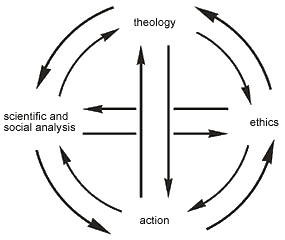Possibilities for Dialogue
Possibilities for dialogue between science
and religion
These can be at the level of:
-
presuppositions
and limit-questions
-
methodological
parallels (see also critical realism in science and
religion) (see also critical realism in science and
religion)
-
areas of common
concern - in particular the challenge of the ecological crisis and the possibility of ‘new paradigm’ thinking and the possibility of ‘new paradigm’ thinking
-
approaches to
possible integration between the thought-worlds of science and religion,
through natural theology or theology of nature (see natural theology vs theology of nature),
or through efforts at a synthesis of the two
It must be pointed out that today the
hegemony lies with the scientific community. Science is a rational enterprise
of unparallelled success (by its own lights - those of providing understanding
of the physical universe - if not necessarily those of furnishing humans with
wisdom as to how to live). Gerd Theissen claims that ‘Nowadays religion is on
the opposition benches and science forms the government. It would be good if religion
could find a way out of its role as a smouldering opposition, and if science
were less arrogant as the government.’
The Bossey Circle is a World Council of
Churches diagram designed to show the interplay between the sciences, theology,
ethics, and action.

A
World Council of Churches diagram
In practice the Bossey Circle all too often
looks like one-way traffic - science sets the parameters for what can be
believed about the world, religious doctrines have to fall in line.
An example often cited is the doctrine of
the Fall, in which science does seem to have restricted the range of what it is
appropriate to believe.
For some theologians this also extends to
considerations about the nature of resurrection and virginal conception (see Peacocke and Polkinghorne compared).
In other cases, however, in particular in
respect of the ultimate fate of the universe, it seems essential for theology
to continue to assert hopes to which astrophysics is in no position to give
support.
Email
link | Feedback | Contributed by: Dr. Christopher Southgate
Source: God, Humanity and the Cosmos (T&T Clark, 1999)
|